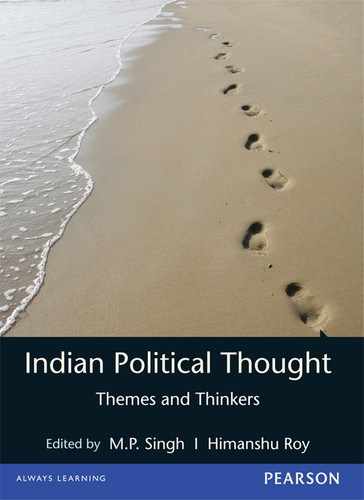Chapter 19
1. Welles Hangen: After Nehru, Who? (London: Rupert Hart-Davis, 1963), p.85.
2. This personal odyssey is briefly narrated by JP himself in his From Socialism to Sarvodaya (Kashi: Akhil Bharat Sarva Seva Sangh Prakashan, 1959, 2nd ed., preface date 1957). It clearly shows the seminal influences of Marx and Marxists, of M.N. Roy, of Social Democrats, and of Gandhi and Gandhians on the evolution of JP’s thought.
Perhaps the most comprehensive collection of JP’s writings and speeches available through regular publication channels is Jayaprakaah Narayan, Towards Total Revolution Search for an Ideology, Vol. 1; Politics in India, Vol. 2, India and Her Problems, Vol.III: Total Revolution, Vol. IV (edited by Brahmanand) Bombay: Popular Prakashan, 1978. See also Jayaprakash Narayan, Socialism, Sarvodaya and Democracy (edited by Bimla Prasad), Bombay: Asia, 1964; Bimal Prasad (ed.), Jayaprakash Narayan, Selected Works, five volumes, Manohar, New Delhi; Ajit Battacharjee, Unfinished Revolution: A Political Biography of Jayaprakash; Sudhanshu Ranjan, Jayaprakash Narayan, NBT, Delhi, 2002; Bimal Prasad, Jayaprakash Narayan, Konark, Delhi, 2002.
3. See his A Pea for Reconstruction of Indian Polity (Wardha, Sarva Seva Sangh Prakashan, 1959) and Swaraj for the People (Varanasi: Akhil Bharat Sarva Seva Sangh, preface date 1961). See also Marguerite J. Fisher, ‘New Concepts of Democracy in Southern Asia’, Western Political Quarterly (Salt Lake City, Utah) - XV-q (December 1962), pp, 625–640.
4. Girilal Jain, ‘Mirror to Modern India: JP the Romantic Revolutionary’, The Times of India (New Delhi), October 9, 1979, p.8.
5. Quoted in M. N. Thakur. ‘Jayaprakash Narayan: An Indian Political Thinker’ in Jigyansa, Vol.1, No.1, October 1996, p.42.
6. Ibid., p. 45.
7. Ibid.
8. Verinder Grover (Ed.). Jayaprakash Narayan, Deep and Deep Publications, New Delhi, 1995, p.15.
9. Ibid., pp. 20–21.
10. From Socialism to Sarvodaya. p.22.
11. Ibid., p.27.
12. Ibid., p.18.
13. Swaraj for the People, p.5.
14. Ibid., p.3.
15. Ibid.
16. From Socialism to Sarvodaya, pp.23–23.
17. Swaraj for the People, p.3.
18. From Socialism to Sarvodaya, pp. 39–41.
19. Swaraj for the People, Chap. 2.
20. Ibid., Chap. 3, and From Socialism to Sarvodaya, pp. 38–39.
21. Swaraj for the People, Chaps 2 and 4. This is a partially revised version of the scheme earlier presented in A Plea for Reconstruction of Indian Polity, which had advocated a single hierarchical structure with each lower level electing the higher - i.e., the Gram Sabha—Panchayat Samiti-ZilaParishad—Vidhan Sabha-Lok Sabha. The revision was motivated by two main considerations: (1) to discourage parochialism and give the mass public a sense of direct participation in the highest level elections and (2) to minimise chances of electoral corruption, by moneyed interests under indirect system of election with small numbers of electors at each level except the lowest.
22. Swaraj for the People, p.4.
23. ‘I saw … how people’s rule became in effect party rule; how party rule in turn became the rule of a caucus or coterie; how democracy was reduced to mere casting of votes; how even this right of vote was restricted severely by powerful parties setting up their candidates from whom alone, for all practical purposes, the voters had to make their choice.’ From Socialism to Sarvodaya, pp.34–35. See also Swaraj for the People, Chaps. 2 and 4.
24. From Socialism to Sarvodaya, p.37.
25. Ibid., p.40.
26. See John R. Wood, ‘Extra-Parliamentary Opposition in India: An Analysis of Populist Agitations in Gujarat and Bihar, Pacific Affairs, Vol.48, No.3 (Fall 1975), pp. 313–334; Ghanshyam Shah, Protest Movements in Two Indian States: A Study of the Gujarat and Bihar Movements (Delhi: Ajanta, 1977).
27. See Jayaprakash Narayan, Total Revolution (Varanasi: Sarva Seva Sangh Prakashan, 1975), and Mahendra Prasad Singh, ‘Jayaprakash Narayan on Parliamentary Democracy and Electoral Reform in India’, Gandhi Marg (New Delhi), Vol.1, No.12 (March 1980), pp.757–64.
28. This aspect of the movement led Romesh Thapar in a contemporary review to remark that if it ‘had insulated itself against the activists of the right who saw in it an ideal anti-Indira lever, then at least the way would have been clear for building a dynamic consensus around the core questions, a consensus cutting across party boundaries and ideologies … But an essentially Gandhian intervention from within the movement of protest to correct the aberrations and to remove the prevailing confusion in perspectives could once again create the possibility of a great cleansing’. Romesh Thapar, ‘Salvaging, the Passion’ in T.K. Mahadevan (ed). Jayaprakash Narayan and the Future of Democracy (New Delhi and Madras: Affiliated East West Press, 1975), pp. 229–30.
29. Nirmal Verma, ‘On Heroism in Our Time’ (Translated from the Hindi by Suresh Sharma), Seminar, No 245 (January 1980), p.75.
